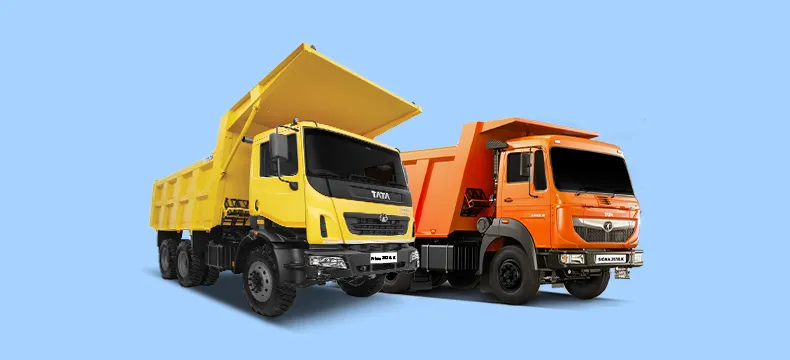29 Dec 2025

Choosing the Right Engine Type: Petrol or Diesel
- Tata Motors
- 9 Sep 2025
- COMMERCIAL VEHICLE
Introduction
The engine is the heart of a truck, enabling it to move and perform essential functions. Different types of engines exist; each suited for a wide range of applications. Furthermore, although there are various types, all engines operate based on a similar fundamental process.
An air-fuel mixture ignites inside the engine, causing an explosion that pushes the pistons down. This generates power, driving the vehicle’s wheels. The cycle repeats continuously, keeping the vehicle in motion as long as the engine runs.
This blog will explain the three most common types of truck engines —petrol and diesel —and outline considerations to make when choosing the right one.
What Are the Types of Petrol and Diesel Engines?
-
Petrol engines:
Petrol engines are internal combustion engines designed to run on petrol (also known as gasoline). The engine uses spark plugs to ignite the air-fuel mixture in the internal cylinders. The ignition causes an explosion that generates power, accelerating the truck from 0 to 100.
-
Diesel engines:
Diesel engines are a type of internal combustion engine specifically designed to run on diesel fuel. Instead of spark plugs, the engine relies on compression ignition to generate power.
Note that, like petrol, diesel is derived from crude oil but is denser and contains more energy than petrol.
What Is the Difference Between Petrol and Diesel Engines?
1. Torque:
Torque is the rotational force produced by the engine. It helps the truck accelerate and attain different speed ranges. An engine producing higher torque is preferred as it enables the truck to accelerate faster and improves its towing capacity.
-
Petrol engines typically produce a lower amount of torque.
-
Diesel engines produce a higher amount of torque compared to petrol engines.
2. Emission:
Once the explosion occurs, along with the release of power, several gases are also released. These exhaust gases exit the engine through a dedicated valve. This process is known as emission. Emissions reveal critical information about the engine's health and have a significant environmental impact.
-
Petrol engines generally have a lower emission rate.
-
Diesel engines tend to have a higher emission rate than petrol engines.
3. Functioning Prerequisite:
Functional prerequisites are the essential elements that the engine primarily needs to operate and perform efficiently. Depending on your truck's usage, these requirements usually need to be addressed regularly.
-
Petrol engines –
You need to refill the petrol tank as it empties. Ensure it at least reaches a minimum level so that the engine receives fuel and begins operating.
-
Diesel engines –
Their functioning prerequisite is similar to that of petrol engines. You need to refill the diesel tank as it empties. The frequency of refuelling is based on your usage.
4. Driving Range:
Driving range is the maximum distance a vehicle can travel on a full tank of fuel or a fully charged battery before needing a refill or recharge. It is an important consideration for choosing the engine type as it impacts operational timelines.
-
Petrol engines –
Generally, these are used in small and light commercial vehicles for short-distance journeys.
-
Diesel engines –
They are used in large, heavy commercial vehicles designed for long-haul transportation.
5. Upfront Purchase and Maintenance Cost:
As the name suggests, the upfront purchase cost refers to the amount paid to acquire the truck. The maintenance cost refers to the expenses incurred to maintain the vehicle's efficiency and prevent wear and tear.
-
Petrol engines –
They are generally cheaper and easier to maintain in comparison to other engine types.
-
Diesel engines –
They are reasonably priced and incur maintenance costs that vary based on usage.
Note that each of the engine type options mentioned has its advantages. The choice ultimately depends on your specific usage requirements and conditions. Consider the engine’s performance, driving range, costs, environmental impact, government incentives, and other factors when selecting the right engine type.
Summing It Up
Engines are the core of a truck or any vehicle, for that matter. They provide the truck with the power to start and keep moving. There are various engine types, each with its advantages and disadvantages. Consider the engine specifications and your vehicle's requirements to select the most suitable engine type.
We at Tata Motors Tanzania offer a range of vehicles with diesel engine options to cater to different operational needs. Designed for efficiency and durability, these trucks cater to diverse business requirements across industries.
FAQs
What is the best engine for heavy-duty trucks: Petrol or Diesel in Tanzania?
Ideally, diesel engines are regarded as the best for heavy-duty trucks.
Which type of engine is best for long highway drives?
All three types of engines are apt for long highway drives. The difference lies more in the cost than in performance.
Which engine has the best pickup, petrol or diesel?
Diesel engines are considered to offer better truck pickup.
- Tags
Latest Blogs



















